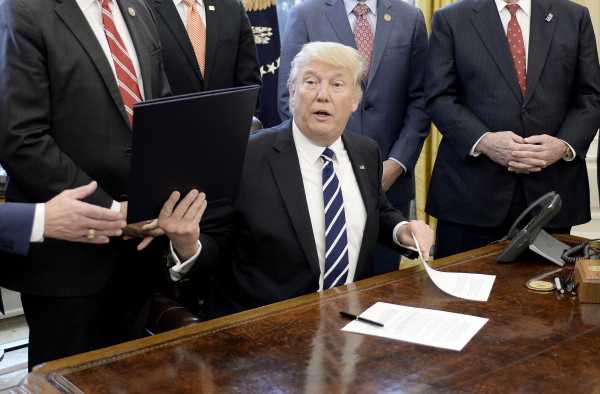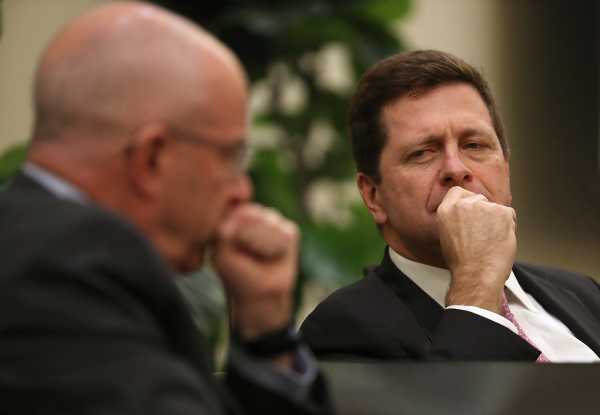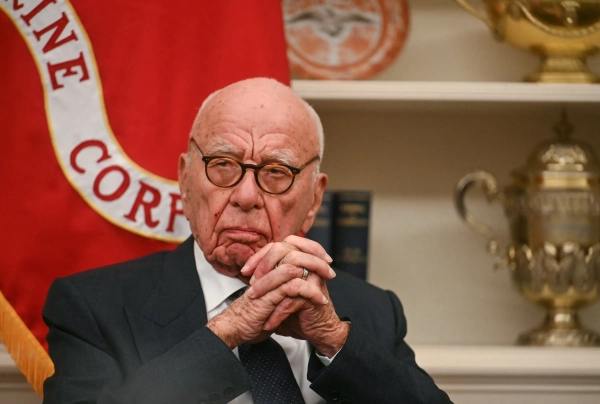
Donald Trump ran for office promising to protect the “forgotten man and woman” and to Make America Great Again for Americans who feel left behind. “It’s not just the political system that’s rigged, it’s the whole economy,” he told supporters during a 2016 speech on the campaign trail. But now in office, Trump isn’t doing much to “un-rig” the system. His administration has systematically dismantled consumer protections for ordinary Americans and compromised protections for everyday investors as well.
The Consumer Financial Protection Bureau under the guide of interim director Mick Mulvaney has moved to rein in many of the consumer protection and enforcement actions taken by his predecessor, Richard Cordray. The bureau has dropped cases against predatory payday lenders, reportedly rolled back its investigation of the Equifax data breach, and reformulated its mission to scale back its reach. Federal regulators in September released AIG from special government oversight mandated after the financial crisis and set aside a legal fight with MetLife. Enforcement actions at the Securities and Exchange Commission and Commodities Futures Trading Commission, Wall Street’s top regulators, have declined, meaning they appear to be going after fewer bad actors and imposing less fines. Mulvaney over at the CFPB hasn’t taken any enforcement actions since taking over at the CFPB in November.
“The top line is that the Trump administration is probably the most anti-investor and consumer protection administration in decades, if not ever,” said Dennis Kelleher, president and CEO of Better Markets, a watchdog group that advocates for stricter financial regulations. “It’s hard not to concede that investor and consumer protections are not a priority for this administration.”
Market regulation advocates see some signs of hope for investor protections, and some are tepidly optimistic about SEC Chairman Jay Clayton. Still, they say regulators under Trump aren’t falling over themselves to keep Wall Street in check and Americans’ pocketbooks protected, and Mulvaney at the CFPB has been especially aggressive in rolling back oversight and undermining the agency of which he is temporarily the head.
“The effective regulation of the financial system is some mixture of rules, of norms, and of people, and all of those are pulling in the wrong direction right now,” Carter Dougherty, communications director of Americans for Financial Reform, said.
Loosening protections is, of course, bad for a consumer trapped in endless debt because of a payday loan or a retiree who loses half of her nest egg because her financial adviser is giving her bad tips. But overly-relaxed regulators could also spell bad news for the broader markets and economy. (Remember the financial crisis, anyone?)
In a new International Monetary Fund working paper, researcher Jihad Dagher looks at the political-economy of 10 financial crises since the 18th century and finds they often have something in common: they were often preceded — and amplified — by an increasing light-touch approach to financial supervision. While after a crisis there’s a big regulatory backlash, such as Dodd-Frank less than a decade ago, over time, regulators, politicians, and even the public essentially forget just how bad it was and start to relax oversight again. And that appears to be what’s happening now — not only in the Trump administration but also in Congress, where a bill is currently making its way through the Senate that would relieve some elements of Dodd-Frank.
“There’s been this moment of amnesia,” said Katy Milani, program director at the liberal-leaning think tank the Roosevelt Institute.



Mick Mulvaney takes a hatchet to consumer protections
The Consumer Financial Protection Bureau was created under the Dodd-Frank financial reform and formed in 2011. Its mission was to protect consumers in the financial sector and arenas such as mortgages, student loans, and credit cards. Under its first director, Cordray, who was confirmed in 2013, the bureau by its own tally handled more than 1.2 million consumer complaints and brought about nearly $12 billion in relief form harmed consumers. Under Mulvaney, it hasn’t taken any enforcement actions so far at all and seems to be at least as equally concerned with protecting financial institutions as it is with protecting consumers.
Mulvaney, who is already director of the Office of Management and Budget, became interim director at the CFPB in November after a short tug-of-war for the spot with Deputy Director Leandra English. And he’s wasted little time making major changes at the agency — he’s dropped ongoing lawsuits, changed the bureau’s mission, and even renamed an obscure fellowship program.
“In a very few number of days, the acting director has done a great deal of damage,” Aaron Klein, fellow in economic studies at the Brookings Institution and former Treasury Department aide, recently told me. “What seems to be happening at the CFPB is kind of a reflexive, anti-whatever the last guy did approach.”
Mulvaney revised the CFPB’s mission statement to include items about addressing “outdated, unnecessary, or unduly burdensome regulations” (in other words, looking for ways to deregulate the consumer finance industry) and “consistently enforcing federal consumer finance law.” In other words, he took an agency dedicated to consumer protections and added a line about deregulation.
The CFPB in February released a new five-year “strategic plan” that would seek to limit the agency’s powers and reconfigure its goals. “We have committed to fulfill the Bureau’s statutory responsibilities, but go no further,” Mulvaney wrote in an agency mission statement.
The White House’s 2019 budget proposal, released in tandem with the new plan, calls for capping the CFPB’s budget as part of a “restructuring period” to help impose “financial discipline” and “reduce wasteful spending.” It holds that the CFPB’s short history is “rife with examples” of “poor financial and personnel management.”
Here’s quick overview of some of the actions Mulvaney and the CFPB have taken since he became interim director in November:
- He reportedly scaled back an investigation into the Equifax data breach, which left the information of 145 million Americans exposed.
- The CFPB dropped a lawsuit against four Kansas-based payday lenders. One of the companies, Golden Valley Lending, was accused of charging people interest rates of up to 950 percent.
- The CFPB closed a four-year investigation into World Acceptance Corporation, a payday lender that has in the past donated to Mulvaney’s political campaigns.
- The CFPB announced plans to reconsider a rule that would have imposed restrictions on payday and short-term lenders, such as making sure borrowers would be able to pay them back, and delayed a rule on prepaid cards that increased consumer protections.
- Mulvaney stripped the enforcement powers from the Office of Fair Lending and Equal Opportunity, the unit responsible for pursuing discrimination cases.
- He requested no funding for the CFPB for the first quarter of the year.
Mulvaney defended his actions in a defiant USA Today op-ed last week, making the case that the CFPB and its single-director setup are too powerful in the first place, and the agency is one that needs to be reined in. “The CFPB is one of the most — if not the most — powerful federal agencies in existence. It is also the least transparent or accountable,” he wrote. “As director, I have almost total control over regulations and access to virtually unlimited funds. In some cases I am even judge, jury and executioner. I do not answer to Congress, to the people I regulate, or even to you.”
The CFPB was created in 2011, and its first director, Cordray, confirmed in 2013. Under Cordray, the bureau, by its own tally, handled more than 1.2 million consumer complaints and brought about nearly $12 billion in relief form harmed consumers. Under Mulvaney, it hasn’t taken any enforcement actions so far at all.
“It really demonstrates that this is an administration that does not care about consumers,” said Milani, from the Roosevelt Institute.
A rule to protect retirement investors hangs in the balance
In 2016, the Department of Labor finalized a rule that would require financial advisers to put their clients’ interests above their own when providing retirement investment advice. It leaves no room for advisers giving financial advice to conceal any potential conflicts of interest — meaning they can’t, say, recommend a certain product because selling it offers a bonus or extra commission to them — and states that all fees and commissions must be clearly disclosed in dollar form to clients so that they know what is at stake for their advisers when they’re making recommendations. Advisers can’t simply recommend “suitable” investments to their clients but instead the best ones for them, which could eliminate some of the commission structures that govern the industry.
The rule, known as the “fiduciary rule,” aims to address conflict of interest in retirement advice in vehicles such as 401(k)s and IRAs. Parts of the rule went into effect in June 2017, but the enforcement arm — which would allow the department to penalize advisers who don’t comply — has been delayed until July 2019.
“You have the definitions and the basic principles in effect, but the specifics that make the rule effective and enforceable have been delayed,” said Barbara Roper, director of investor protection at the Consumer Federation of America. “In the meantime, the DOL has said they’re not bringing enforcement actions where they see good faith efforts at compliance, which would be fine except there’s no evidence that they’re bringing enforcement actions where there’s no good faith efforts at compliance, either.”
Trump and Republicans in Congress can’t immediately scrap the rule entirely (they could conceivably pass a new law if Democrats got on board to do so, which is unlikely). It’s already beyond the period for Congress to get rid of it through the Congressional Review Act, and, as mentioned, parts of the rule are already in place. But they’d certainly like to. Anthony Scaramucci, who had a short stint in the White House and was a fundraiser for Trump’s campaign, in a 2016 interview compared the DOL rule to the Dred Scott decision, an 1857 Supreme Court ruling that held that African Americans weren’t US citizens. Gary Cohn, Trump’s top economic adviser, in February 2017 told the Wall Street Journal the rule was bad for consumers and is “like putting only healthy food on the menu.”
The rule’s opponents say it is a paternalistic effort that reduces investor choice and might steer firms toward working only with higher-income clients. They say it could harm small independent broker-dealers that lack the financial resources to invest in meeting all of the rule’s requirements. Proponents of the rule say it’s worth it to make sure retirement investors aren’t misled.
“I’m sure that this administration would like to just gut it,” Kate McBride, the founder of think tank the Committee for the Fiduciary Standard, said.
There is speculation that the Trump administration will use the delay in the rule’s full implementation to put forth another rule rescinding it. They can also seek to undermine it. The SEC is also working on its own version of a fiduciary rule that some consumer advocates say could give Wall Street an end run around the Labor Department’s rule. While firms would presumably have to comply with both rules where there is an overlap, and the SEC rule could be just as strong as the Labor Department’s rule, they worry that the SEC rule might be weak and potentially coupled with a provision saying that compliance with it is sufficient for the Labor Department’s rule as well.
“There’s certainly a concerted effort underway either to water down the DOL rule directly, to provide an end-run around it through the SEC rule or state insurance rules, or some combination of the two,” Roper, from the Consumer Federation for America, said.



A lot of Trump’s financial regulatory regime is still taking shape, but it’s not looking great
Elsewhere in the arena of financial regulations and consumer finance and investor protections, exactly what shape the Trump administration’s policies and actions will take are unclear.
There are certainly some concerning signs. Trump is surrounded by multiple industry-friendly figures. Cohn and Treasury Secretary Steven Mnuchin worked at Goldman Sachs. Shahira Knight, who is heading the National Economic Council’s office on tax and retirement policy, spent several years as a lobbyist for Fidelity Investments.
Federal regulators in September removed AIG’s too-big-to-fail designation that dates back to the financial crisis that subjected the company to more intense supervision. And in January, regulators and MetLife agreed to set aside a fight over whether it should face additional scrutiny. Of the four non-bank entities that were designated as “systemically important” after the crisis, only one, Prudential, is still on the list and subject to additional scrutiny. (GE Capital overhauled its organization and was taken off in 2016.)
Enforcement actions at the SEC and CFTC — meaning monetary fines, restitution fees, and other penalties against firms and individuals who engage in bad behaviors such as market manipulation, insider trading, and fraud — declined last year. But those agencies were still staffing up then, and it’s this year that will be the real tell. Trump is just now getting his appointees in place at a number of financial regulators, including the Office of the Comptroller of the Currency and the Federal Reserve, and his picks for the Federal Deposit Insurance Corporation still isn’t in place.
“This year didn’t involve as much change as it was setting up the pieces for change next year,” Klein, from the Brookings Institution, said.
There are some positive signals in the mix as well. The OCC, which regulates and supervises banks, in January hit Citibank with a $70 million penalty for failing to comply with a 2012 order related to anti-money laundering procedures.
“It’s an indicator that they’re not going to just let the banks do whatever they want,” said Ian Katz, an analyst at Washington research firm Capital Alpha Partners.
When Reuters in December reported the CFPB might be reviewing Wells Fargo fines, President Trump responded with a tweet saying that the fees wouldn’t be dropped.
To be sure, that might have been more of a political gesture than a policy one. “[It’s] putting out a populist tweet when in fact his administration is doing the exact opposite,” Klein said.
“I do think that Trump appreciates the good publicity…that comes with perp walks and charging big names with crimes,” Katz said.



Jay Clayton at the SEC might be the wildcard
Clayton, a former partner at Sullivan & Cromwell LLP whose former clients included Goldman Sachs, Barclays, and Alibaba, is certainly a Wall Street insider. But since he was sworn in as SEC chair in May of 2017, he’s been a bit of a surprise for watchdogs who were worried about him.
Better Markets president Kelleher told me it’s “too early to figure out what Jay Clayton” is doing at the SEC, though some of what he’s done has been “pleasantly surprising.” Clayton rejected an attempt by stock exchanges to delay the implementation of the consolidated audit trail, a surveillance system of the US equity market.
He is also opposing the roll-back of financial protection rules on money market funds and named Brett Redfearn, formerly of JPMorgan, as director of the SEC’s division of trading and markets, both of which Kelleher said were good signs. “People thought that he was going to be more open to deregulating or rolling back some of the Dodd-Frank rules, and he may be, but we haven’t seen that yet,” he said.
Clayton has publicly positioned himself as an advocate for mom and pop investors. He has put out warnings on Bitcoin and other cryptocurrencies and last week alongside the CFTC’s Christopher Giancarlo testified before the Senate Banking Committee about the space. In a speech delivered at the New York Economic Club in July of last year — his first public address as SEC chair — Clayton said his commission’s analysis “starts and ends with the long-term interests of the Main Street investor” and spoke of “Mr. and Ms. 401(k).” He also talked about a need for more public companies.
There is a cynical reading to his positioning, Susan Antilla and Gary Rivlin recently wrote in the Intercept. They note he has reduced
“We’re all in a wait-and-see attitude,” Kelleher said.
Sourse: vox.com






